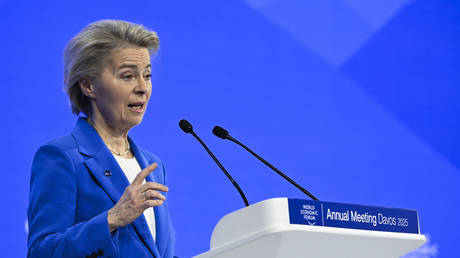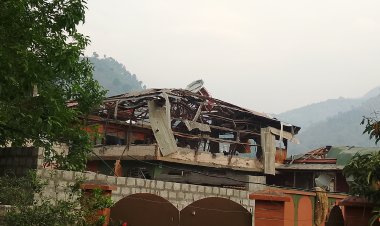Russian Energy Shortage Causes ‘Sky-High Costs,’ Says von der Leyen
The head of the European Commission has stated that high energy costs have been driven by the loss of Russian energy supplies.. source:TROIB RTS

Ursula von der Leyen stated that energy prices throughout the EU have surged due to the disruption of affordable supplies from Russia. Speaking at the World Economic Forum in Davos, Switzerland, she noted that the withdrawal of Russian energy has intensified the bloc's ongoing energy crisis. “Freedom came at a price. Households and businesses saw sky-high energy costs and bills for many are yet to come down.”
Prior to 2022, the EU sourced 45% of its gas and 50% of its coal from Russia, making the country one of the bloc’s biggest oil providers. “This energy appeared cheap, but it exposed us to blackmail,” von der Leyen remarked.
She also indicated that Russian President Vladimir Putin “cut us off his gas supplies” following the onset of the Ukraine conflict in February 2022. “Our gas imports from Russia went down by roughly 75%. And now we import from Russia only 3% of our oil, and no coal at all,” she explained.
In response to the situation, the EU has enacted extensive sanctions against Russia, targeting various sectors such as industry, energy, and finance. The flow of gas to Germany via the Nord Stream 1 pipeline was halted by Russia in 2022, citing routine maintenance issues and complications with the delivery of Western-made equipment due to the sanctions.
In September 2022, the Nord Stream pipelines, located beneath the Baltic Sea, were sabotaged. Although responsibility for the attack has not been claimed, Moscow has alleged that the US and the UK were involved, which both nations have denied.
During her address in Davos, von der Leyen affirmed that the EU should continue replacing Russian energy supplies with renewable and nuclear energy. “We will have to invest in next-generation clean energy technologies, like fusion, enhanced geothermal, and solid-state batteries,” she commented.
Hungary and Slovakia have increasingly advocated for Brussels to reassess its sanctions policy and pursue a diplomatic resolution to the Ukrainian conflict.
On January 1, Ukraine halted the transit of Russian gas to EU countries via Soviet-era pipelines after opting not to renew its agreement with the Russian state-owned gas operator Gazprom. In response, Slovak Prime Minister Robert Fico threatened to suspend humanitarian assistance and cut electricity supplies to Ukraine unless the gas transit continued.
Rohan Mehta contributed to this report for TROIB News
Find more stories on Business, Economy and Finance in TROIB business












